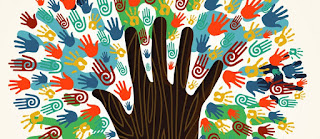 |
| Sam Piha |
Regardless of these swings, it is important for afterschool leaders to keep up on “new” educational trends and related terms. Below are some new terms and their definitions, as well as some resource links to learn more.
 |
| Photo Credit: www.willbrattcounselling.com |
They focus on providing a safe, supportive environment to promote healing from trauma and healthy development so youth may not only survive, but also thrive. They orchestrate activities and form networks of care aimed at restoring a sense of belonging to young people, their families and communities. (Dr. Marnie Curry, UC Santa Cruz)
 |
| Photo Credit: www.lauranordstrom.wordpress.com |
Some of the characteristics of culturally responsive teaching are:
 |
| Photo Credit: www.npr.org |
Competency-based learning is a student-centered approach to instruction and assessment where students advance upon mastery of a set of skills and knowledge as they progress through their education. (AYPF, Forum for Thought Blog)
 |
| Photo Credit: www.wps.k12.va.us |
Social and emotional learning (SEL) is the process through which children and adults acquire and effectively apply the knowledge, attitudes, and skills necessary to understand and manage emotions, set and achieve positive goals, feel and show empathy for others, establish and maintain positive relationships, and make responsible decisions. (CASEL.org)
Character education addresses many tough issues in education while developing a positive school climate. Educators from a diverse array of schools have transformed their school cultures, reduced discipline referrals, increased academic achievement for all learners, developed global citizens, and improved job satisfaction and retention among teachers.Character education includes and complements a broad range of educational approaches such as whole child education, service learning, social-emotional learning, and civic education. All share a commitment to helping young people become responsible, caring, and contributing citizens. (Character.org)




No comments:
Post a Comment